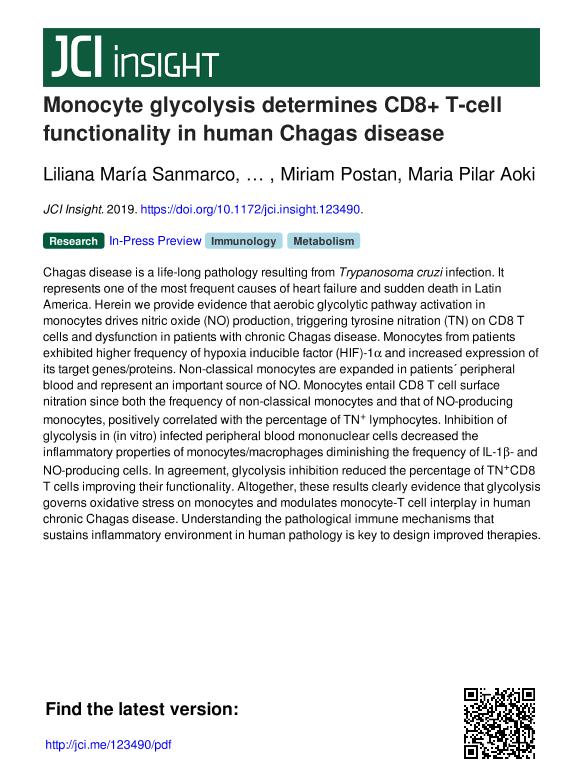Artículo
Monocyte glycolysis determines CD8+ T-cell functionality in human Chagas disease
Sanmarco, Liliana Maria ; Eberhardt, Natalia
; Eberhardt, Natalia ; Bergero, Gastón
; Bergero, Gastón ; Quebrada Palacio, Luz Piedad
; Quebrada Palacio, Luz Piedad ; Martino Adami, Pamela Victoria
; Martino Adami, Pamela Victoria ; Visconti, Laura Marina; Minguez, Angel Ramón; Hernández-Vasquez, Yolanda; Carrera Silva, Eugenio Antonio
; Visconti, Laura Marina; Minguez, Angel Ramón; Hernández-Vasquez, Yolanda; Carrera Silva, Eugenio Antonio ; Morelli, Laura
; Morelli, Laura ; Postan, Miriam
; Postan, Miriam ; Aoki, Maria del Pilar
; Aoki, Maria del Pilar
 ; Eberhardt, Natalia
; Eberhardt, Natalia ; Bergero, Gastón
; Bergero, Gastón ; Quebrada Palacio, Luz Piedad
; Quebrada Palacio, Luz Piedad ; Martino Adami, Pamela Victoria
; Martino Adami, Pamela Victoria ; Visconti, Laura Marina; Minguez, Angel Ramón; Hernández-Vasquez, Yolanda; Carrera Silva, Eugenio Antonio
; Visconti, Laura Marina; Minguez, Angel Ramón; Hernández-Vasquez, Yolanda; Carrera Silva, Eugenio Antonio ; Morelli, Laura
; Morelli, Laura ; Postan, Miriam
; Postan, Miriam ; Aoki, Maria del Pilar
; Aoki, Maria del Pilar
Fecha de publicación:
09/2019
Editorial:
American Society for Clinical Investigation
Revista:
JCI Insight
ISSN:
2379-3708
Idioma:
Inglés
Tipo de recurso:
Artículo publicado
Clasificación temática:
Resumen
Chagas disease is a life-long pathology resulting from Trypanosoma cruzi infection. It represents one of the most frequent causes of heart failure and sudden death in Latin America. Herein we provide evidence that aerobic glycolytic pathway activation in monocytes drives nitric oxide (NO) production, triggering tyrosine nitration (TN) on CD8 T cells and dysfunction in patients with chronic Chagas disease. Monocytes from patients exhibited higher frequency of hypoxia inducible factor (HIF)-1α and increased expression of its target genes/proteins. Non-classical monocytes are expanded in patients´ peripheral blood and represent an important source of NO. Monocytes entail CD8 T cell surface nitration since both the frequency of non-classical monocytes and that of NO-producing monocytes, positively correlated with the percentage of TN+ lymphocytes. Inhibition of glycolysis in (in vitro) infected peripheral blood mononuclear cells decreased the inflammatory properties of monocytes/macrophages diminishing the frequency of IL-1β- and NO-producing cells. In agreement, glycolysis inhibition reduced the percentage of TN+CD8 T cells improving their functionality. Altogether, these results clearly evidence that glycolysis governs oxidative stress on monocytes and modulates monocyte-T cell interplay in human chronic Chagas disease. Understanding the pathological immune mechanisms that sustains inflammatory environment in human pathology is key to design improved therapies.
Palabras clave:
GLICOLISIS
,
TRIPANOZOMA CRUZI
,
MACROFAGOS
Archivos asociados
Licencia
Identificadores
Colecciones
Articulos(CIBICI)
Articulos de CENTRO DE INV.EN BIOQUI.CLINICA E INMUNOLOGIA
Articulos de CENTRO DE INV.EN BIOQUI.CLINICA E INMUNOLOGIA
Articulos(IMEX)
Articulos de INST.DE MEDICINA EXPERIMENTAL
Articulos de INST.DE MEDICINA EXPERIMENTAL
Citación
Sanmarco, Liliana Maria; Eberhardt, Natalia; Bergero, Gastón; Quebrada Palacio, Luz Piedad; Martino Adami, Pamela Victoria; et al.; Monocyte glycolysis determines CD8+ T-cell functionality in human Chagas disease; American Society for Clinical Investigation; JCI Insight; 4; 18; 9-2019
Compartir
Altmétricas



